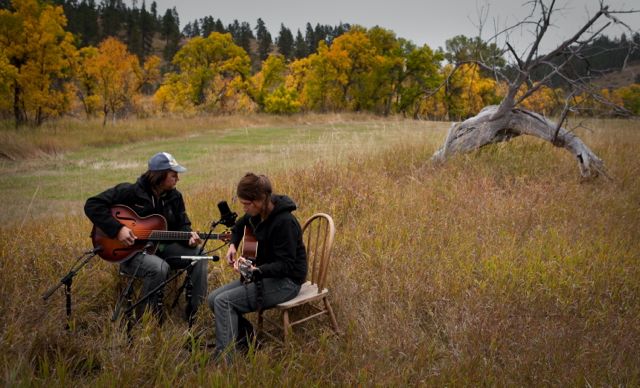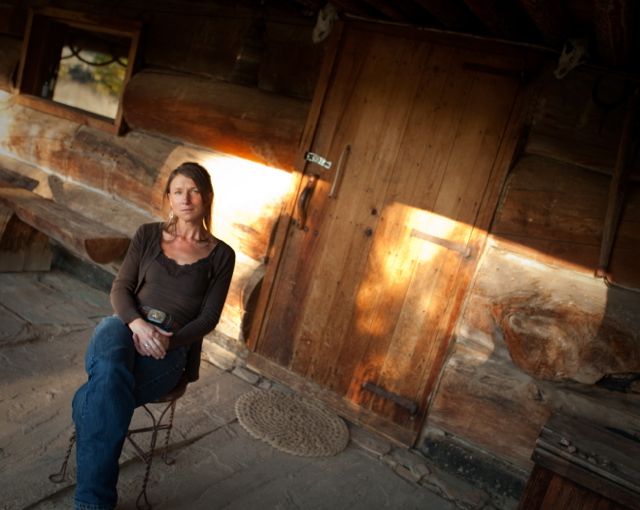Singer-songwriter Martha Scanlan is originally from Minnesota but her music has been her vehicle to far-flung locales. Like to the Appalachians where she was a member of The Reeltime Travlers (and, with that band, appeared on the Cold Mountain soundtrack). And, most recently to Montana. Or, back to Montana, as that state is where Scalan lived, years ago, and where she taught herself to play guitar.
Scalan’s critically-acclaimed debut solo album, The West Was Burning, led to tours and headlining slots at festivals in both the U.S. and Europe. That album came out in ‘07, but three years earlier she won awards in two categories of the Chris Austin songwriting contest at Merlefest. And her song “Little Bird Of Heaven” was recently featured in celebrated American novelist Joyce Carol Oates’ latest book by the same name,” according to her bio.
Her most recent album, Tongue River Stories, was written and recorded on the 100-year old ranch where she lives and works. Scalan talks about that project in advance of her Friday, Sept. 6, appearance at The Grey Eagle. (All ages seated show. 9 p.m., $10 in advance or $12 day of show.)

Mountain Xpress: Did you find that moving from Appalachia to a 100 year-old cattle ranch in Montana changed your approach to songwriting? In what ways do you think that your surroundings (and your work on the ranch) inform your music?
Martha Scanlan: I don’t know that my approach to songwriting has changed so much as the way that I listen and what’s coming through. It’s interesting to see how the landscape and the work show up in the songs, in the music and the words but also in the sense of space between the words. It’s a vast, quiet place, and working cattle the way we do on horseback is a deeply quiet kind of work. It’s all about energy and rhythm and motion — it’s brought a deeper sense of connection with music for sure.
The lyrics from “Tongue River Stories” read like poetry. I wondered if you write the lyrics first, as poems. And also if you feel a connection to the cowboy poetry tradition. Songwriting is such an endlessly lovely mystery to me — more and more it seems like entering a current. For me, the words and music seem to flow together but I try to give that room to shift and change. I spend a lot of time with an 83 year-old cowboy who recites poems of all kinds and is a fantastic storyteller and cowboy. He’s really my connection to that tradition, and it’s such a beautiful one.
You’re working on a series of field recordings for which you flew in musician friends to record in and around your cabin. Can you tell us about that project? How do the songs that you wrote work with the field recordings, and who are the musician/friends you’ve involved? I have always been interested in the way that landscape informs and shapes the way we move through the world, and the way that songs come out of a particular landscape. Living in Appalachia was a huge influence in that sense, the way that songs and fiddle tunes are so deeply connected to people and place and belonging.
I really wanted to record the songs coming out of this ranch landscape in the place they were written, and that became the “Tongue River Stories” project.
For the Autumn session I flew out musician friends Jon Neufeld from Black Prairie, Byron Isaacs from Ollabelle/The Levon Helm Band/Amy Helm Band, and engineer Aaron Youngberg (and Erin Youngberg from Finders and Youngberg). Filmmaker Dawson Dunning, who is fifth-generation from a neighboring ranch, came out to film the recordings (the videos can be found on youtube or www.marthascanlan.com, the record is available on Amazon and iTunes). Some of the songs were recorded way up in a meadow, one on my porch, a couple in my cabin. One of the amazing things about this place is the quiet. The space between the notes is the sound of the place itself, crickets, shushing leaves, vast quiet. So that was the Autumn session. The Winter session will be coming out in December.
You also touched on how you’ve been influenced by your time in Appalachia and the way music, landscape and people are intertwined. Do you see that in Montana as well? And how does that experience continue to inspire you? I live in a really amazing and unique old ranching community where families have been ranching together in the same piece of country for four and five generations. The country is rugged, so most all of our work is done on horseback. So not only are songs and poems and stories passed down, but also intimate knowledge about the place itself and the work, old secrets about horses and working cattle. The old cowboy I work for is third-generation here, he tells me stories about this place that might be from 50 or 100 years ago, or might be from last week. I don’t know that I have ever experienced such a deep sense of intimacy and belonging with a place, and that seems to keep unfolding.
What’s in store for your Sept. 6 show at The Grey Eagle? How do you feel about returning the area, and what can we expect from the show? I am really excited to bring these new songs back to Asheville, and to play with old friends the Stuart Brothers and new friend Josh Oliver. The Grey Eagle is one of my favorite venues in the whole country, just such a great vibe. Leaving the ranch is always a social crap-shoot — I either have nothing to say or waaaay too much to say, but the music always says just what it needs to, just what it wants to. I love the thought of one landscape telling stories to another.




Before you comment
The comments section is here to provide a platform for civil dialogue on the issues we face together as a local community. Xpress is committed to offering this platform for all voices, but when the tone of the discussion gets nasty or strays off topic, we believe many people choose not to participate. Xpress editors are determined to moderate comments to ensure a constructive interchange is maintained. All comments judged not to be in keeping with the spirit of civil discourse will be removed and repeat violators will be banned. See here for our terms of service. Thank you for being part of this effort to promote respectful discussion.